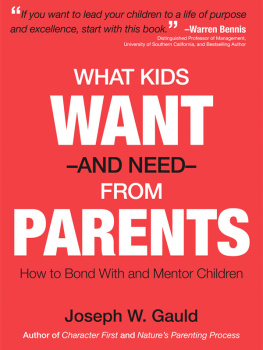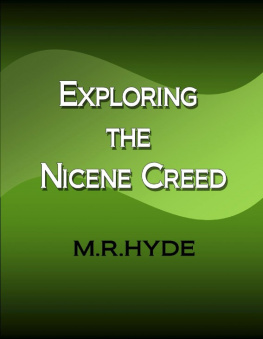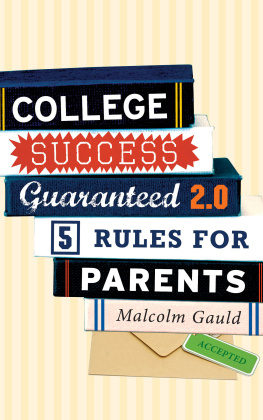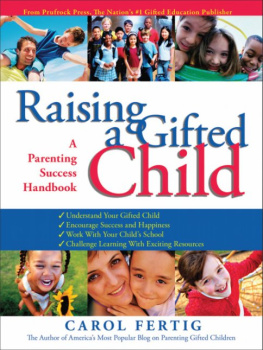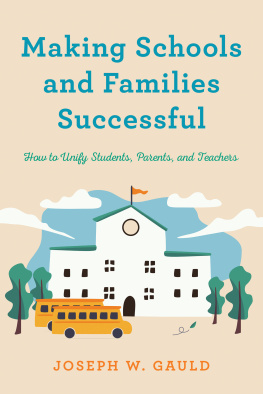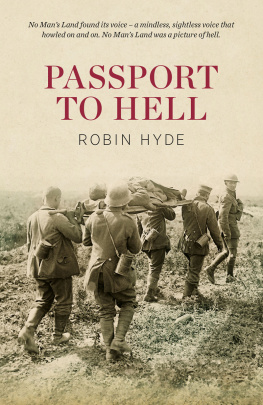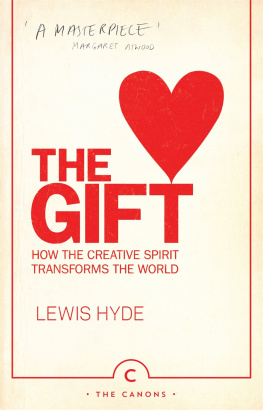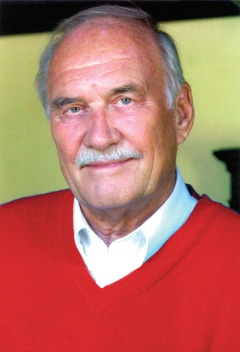After reading this book, it should be clear that my primary teachers in developing it were Hyde families, including my own. What may not be obvious is the wisdom that came from the dedication of Hyde teachers, who work tirelessly to keep the Hyde process at a level of excellence.
I want to pay a special word of thanks to those Hyde families, including my own, who shared their personal stories in the book. This was not an easy task. They not only helped to bring a reality to the power of PEDs and NEDs in our lives, but also how dealing with them strengthens our bonds and mentorships with our children.
Finally I want to thank my editor Cindy Warnick for her dedication and integrity and for making this a much better book. I also want to thank my agent, Laura Yorke, for her help, enthusiasm, and encouragement.
I believe nature dictates the roles for parents and children. The farmer milks the cows and plants the fields according to natures plan. Just as placing natures dictates above the farmers own desires is essential to his success as a farmer, so is placing natures dictates for the growth of children above our own desires essential to our success as parents.
We may desire to make our children happy, and for them to be happy all the time, but nature dictates that we prepare them for life, which inevitably involves challenge, adversity, and struggle. They are going to experience lifes consequences like uncertainty, failure, and unhappiness along with experiencing confidence, success, and happiness.
On the surface, Im an unlikely discoverer of natures parenting process. My educational background is a bachelors degree in economics and a masters in mathematics, and Im primarily known today as the founder of Hyde Schools. But my story will explain how I ultimately became deeply immersed in learning the powerful process of how nature expects us to raise children.
My journey of discovery began when I graduated from Bowdoin College in 1950. I woodenly followed my classmates in entering business to become rich and famous. But within months, I knew business wasnt what I was cut out to do.
So I stepped back and took an honest look at myself. I loved baseball and writing songs, but wasnt good enough to make either a career. The only thing I excelled at was helping my mother and aunt raise my two younger brothers and two cousins, and then being a counselor at a summer camp. I painfully realized my calling was in teaching.
I was humiliated, thinking those that can, do; those that cant, teach. I would be stuck with a bunch of kids and never be rich or famous. To soothe my ego, I resolved to be a great teacher so students would come back years later to thank me for making a difference in their lives.
While this resolve was self-serving at the time, it did deeply commit me to the lives of my students. That commitment ultimately transformed my life.
My intense dedication gave me a fine career as a teacher, coach, and administrator. But my commitment to make a difference in the lives of students ultimately led to a crisis of conscience at a New Years Eve party in 1962.
I had a lot to celebrate that night. The economy was booming; our family finally had our own home after years in boarding-school dormitories. My appointment as assistant headmaster indicated I would soon be heading my own school.
I loved parties, but as the evening developed, I knew something was wrong. My smile was too fixed, I was trying too hard to be sociable, I felt a growing emptiness inside. Finally I couldnt take it anymore and had to get off by myself . I ended up sitting in the dark, on the edge of an empty stage. I could hear the laughter and music below me in the faculty lounge.
I cried for the first time in years, hardly understanding why. I was not drunk. I felt like a maudlin fool; I told myself I was being ridiculous. But for the life of me I could not stop those tears.
Today I understand those tears as part of a process helping to realize my true destiny. By expressing and dealing with our deeper emotions, we enable ourselves to transcend them in order to hear our conscience, which I consider today not just the final determiner of right and wrong, but as the compass that leads us on the path of our true destiny.
At thirty-five, I had reached the top of my profession; it seemed I was destined for a headmastership at some prestigious prep school. But my tears began my awareness that I lacked a deeper sense of fulfillment. And now my conscience was confronting me.
I realized our educational system was failing to respect the deeper potentials of kids, to truly prepare them for life, and that I was part of that system.
In my calculus class for example, I told a lazy, arrogant, and self-centered fourteen-year-old genius his attitude would crucify him in life. Yet I was giving him my highest grade! Then I told a discouraged Vermont farm boy to ignore the feeling he described to meI work twice as hard as everyone else and get half as much out of it.and trust that his character would someday ensure his goal of becoming a top engineer. Yet I was giving him my lowest grade!
(Years later, the Vermont boy did become a highly respected engineer, while the genius became unemployed in spite of graduating from MIT at age eighteen with an A average.)
That night at the New Years Eve party I thought about the failure of our educational system to draw out the deeper potential of kids and prepare them for life. The system was not only failing my students, it was failing students everywhere. I shuddered as I realized if it wasnt my responsibility to change the system, then whose responsibility was it?
My Path Changes
I was at a crossroad. The empty feeling in my stomach told me that no matter how successful I might appear, no matter how assured my future as a headmaster, I could not continue on that path. It was as if in the middle of the night, I was plucked out of my comfortable life in a giant game of morality and tagged it.
I got up and walked back to the party. Now my empty feeling was replaced by a profound inner tension. I knew I had made a New Years resolution that would ultimately change the course of my life.
Two years later, I accepted the headmastership of Berwick Academy in South Berwick, Maine. I was encouraged that my character-based program brought a new spirit to the school, but I soon realized I was envisioning change beyond what the schools trustees would accept. Rather than compromise the program, I resigned after a year.
I was proud of the way I stood by my principles, but totally at sea as to what to do next. Another headmastership seemed fruitless, because my experience at Berwick confirmed I was envisioning change beyond what the system could or would accept. Founding a new school without resources or experience seemed foolhardy. If I failed, how would I provide for my family?

